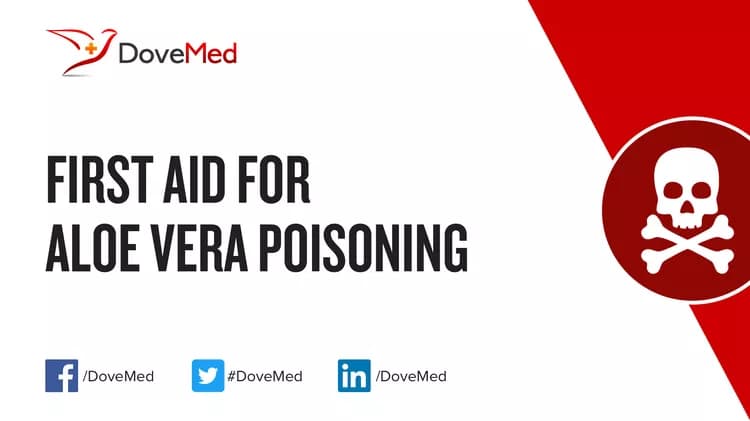What is Aloe Vera Poisoning?
- Aloe vera is a wild (cactus-like appearing) plant having thick and fleshy, long, pointed leaves with serrated edges. It is seen in tropical regions of the world
- Aloe vera is harvested commercially for use in skin care lotions and cosmetics, medicated ointments and creams (in treating skin burns), as a dietary supplement, and in several other herbal and native medicines
- Aloe Vera Poisoning is the accidental or intentional intake of the plant or plant product in significantly higher amounts to cause toxicity
- The condition is diagnosed based upon the clinical history, combination of signs and symptoms, and additional tests (that may include, in some cases, radiological studies and laboratory tests)
Aloe Vera Poisoning may be also referred to as Aloe Vera Toxicity.
What are the Causes of Aloe Vera Poisoning?
- Aloe Vera Poisoning is caused by eating aloe vera plant or plant products, such as cosmetic creams or burn medications
- This intake could be accidental, or in some cases intentional, to bring self-harm
Note: The compound can interact with other prescribed or non-prescribed medications in the body. Such interactions may enhance the therapeutic effects of other medications being taken, resulting in undesired side effects.
What are the Signs and Symptoms of Aloe Vera Poisoning?
The signs and symptoms of Aloe Vera Poisoning can vary from one individual to another. It may be mild in some and severe in others. The signs and symptoms may include:
- Vomiting and/or diarrhea
- Vision abnormalities including loss of vision
- Breathing difficulties due to substance inhalation and/or swollen throat
- Stomach pain that may be severe
- Skin irritation and skin rashes due to an allergic response
How is First Aid administered for Aloe Vera Poisoning?
First Aid tips for Aloe Vera Poisoning:
- Call 911 or your local emergency help number, for emergency assistance
- Call the Poison Control Center at 1-800-222-1222 (or your local poison control center) for further instructions
- Provide them with information such as the compound taken, quantity and time of ingestion, age, weight and general health status of affected individual
- Confirm that the airways are protected; also, ensure breathing and the presence of pulse
- Unless instructed by a healthcare professional, DO NOT induce vomiting in the affected individual
- Clean the mouth to remove any remaining compound; wipe mouth with a wet cloth
- Take individual to emergency room (ER) for further treatment
- Always try to take the plant or plant product to the ER
The emergency medical health professional might perform the following steps towards treating the condition:
- Medically manage symptoms and provide breathing support, if necessary
- Administer fluids by an intravenous drip line
Who should administer First Aid for Aloe Vera Poisoning?
First aid for Aloe Vera Poisoning is administered by healthcare professionals.
- The individual who is affected, or someone near, should call 911 for emergency assistance (or the local emergency number)
- They should also call the poison control center at 1-800-222-1222 (or the local poison control center) and follow instructions
What is the Prognosis of Aloe Vera Poisoning?
- The prognosis of Aloe Vera Poisoning is dependent on the amount of substance consumed, time between consumption and treatment, severity of the symptoms, as well as general health status of the patient
- If the individual can recover from the symptoms that occur due to mild poisoning, the outcome is generally good, with appropriate medication and early support. In most cases, the affected individuals are known to fully recover
- In case of severe symptoms due to an allergic reaction to the substance, it may worsen the outcome and/or prolong time of recovery
In general, toxicities are common situations in the emergency departments. A majority of the cases are often not fatal, when appropriate treatment is given.
How can Aloe Vera Poisoning be Prevented?
Aloe Vera Poisoning can be prevented by:
- Keeping any poisonous/hazardous chemicals and other materials out of children’s reach
- Avoiding eating wild berries and plants, especially if you have no information about them
- Following working in the garden or fields, hiking, or camping, always wash hands thoroughly, prior to eating anything
- Always follow instructions for usage of any health or cosmetic products
- Keeping cosmetics, medications, and other healthcare products out of reach of children in child-proof containers
- Being aware of basic first aid steps in case of an emergency (such as inadvertent poisoning)
It is important to give your healthcare provider a complete list of prescription and non-prescription medications that are being currently taken. This will help them in assessing the possible drug interactions within various medications and help avoid/prevent accidental or unintentional toxic drug effects.
What are certain Crucial Steps to be followed?
- Call 911 (or your local emergency number) for emergency assistance, if symptoms are life-threatening
- Call Poison Control Center at 1-800-222-1222 (or the local poison control center) and follow the recommend steps
- It would be helpful if the following information is readily available:
- Type, amount and time of consumption of the substance
- Age and weight of the individual
- And, the overall health status of the individual
Related Articles
Test Your Knowledge
Asked by users
Related Centers
Related Specialties
Related Physicians
Related Procedures
Related Resources
Join DoveHubs
and connect with fellow professionals


0 Comments
Please log in to post a comment.